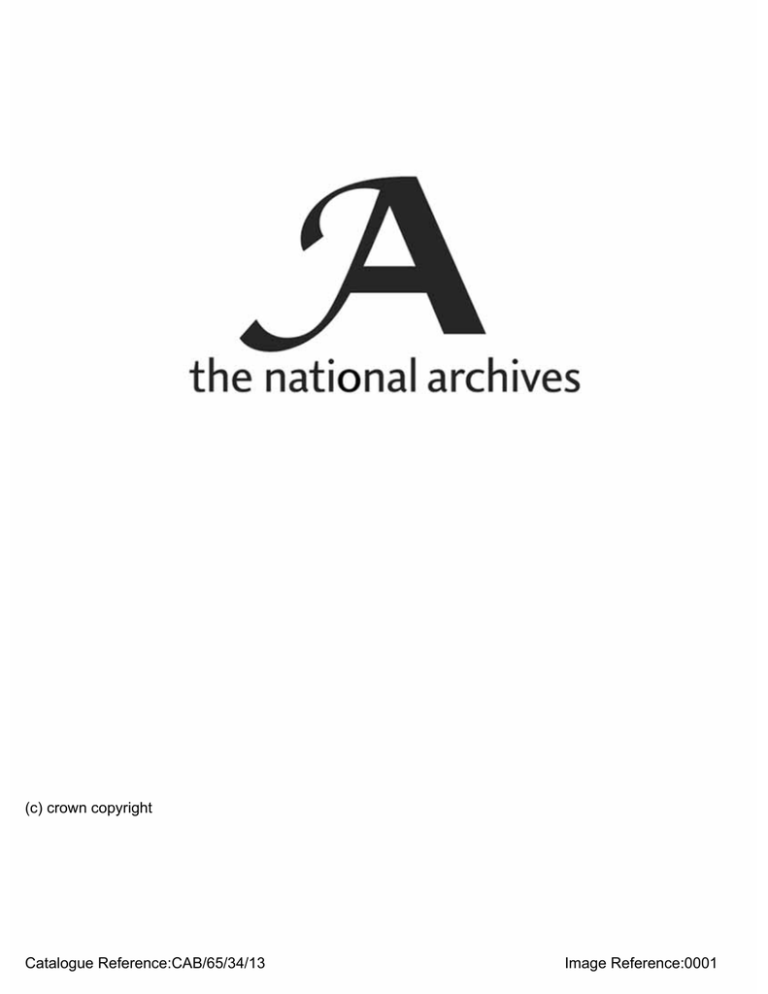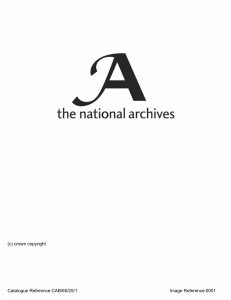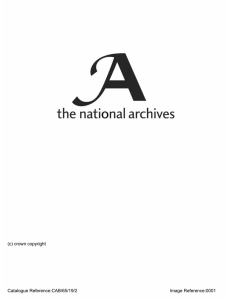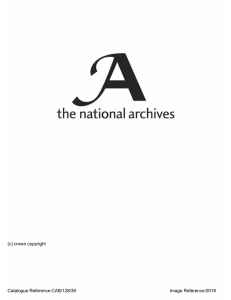(c) crown copyright Catalogue Reference:CAB/65/34/13 Image Reference:0001
advertisement

(c) crown copyright Catalogue Reference:CAB/65/34/13 Image Reference:0001 SECRET. W;M; :Copr:NW ( (43)V 39tb Conclusions. TO B E K E P T U N D E R LOCK A N D K E Y It is requested that special care may be taken to ensure the secrecy of this document WAR CONCLUSIONS C A B I N E T 59 (43). of a Meeting of the War Cabinet held at 1 0 Downing S.W. 1, on Tuesday, April 2 7 , 1 9 4 3 , at 6 - 1 5 P.M. Street. "''v ' Present: The Right Hon. WINSTON S . CHURCHILL, M.P,, Prime Minister (in the Chair). The Right Hon. C. R. ATTLEE, M.P., The Right Hon. ANTHONY EDEN, M.P., Secretary of . State for Dominion Secretary of State for Foreign Affairs. Affairs." '"" The Right Hon. Sir JOHN ANDERSON, The Right Hon. ERNEST BEVIN, M.P., Minister of Labour and National M.P., Lord President of the Council. Service. The Right Hon. HERBERT . MORRISON, M.P., Secretary of State for the Home Department and Minister of Home Security. The following were also present: The Right Hon. S. M. BRUCE, Repre- Sir RAMASWAMI MUDALIAR, Represen­ sentative of the Government of the tative of India. Commonwealth of Australia. The Right Hon. Sir KINGSLEY WOOD, The Right Hon. VISCOUNT CRANBORNE, Lord Privy Seal. M.P., Chancellor of the Exchequer. Hon. OLIVER The Right Hon. L. S. AMERY, M.P., Colonel the Right STANLEY, M.P., Secretary of State Secretary of State for India and for the Colonies (Item 6 ) . , Secretary of State for Burma. The Right Hon. A. V . ALEXANDER, The Right Hon. Sir JAMES GRIGG, M.P., Secretary of State for War. M.P., First Lord of the Admiralty. The Right Hon. Sir ARCHIBALD The Right Hon. LORD PORTAL, Minister of Works (Item 7). SINCLAIR, Bt., M.P., Secretary of State for Air. The Right Hon. BRENDAN BRACKEN, The Right Hon. the EARL OF SELBORNE, Minister of Economic Warfare M.P., Minister of Information. (Item 8). H. F. Mr. DUNCAN SANDYS, M.P., ParliaCaptain the Right Hon. Postmastermentary Secretary, Ministry of CROOKSHANK, M.P Supply (Item 7 ) . General (Item 6 ) . The Hon. Sir ALEXANDER CADOGAN, Admiral of the Fleet Sir DUDLEY POUND, First Sea Lord and Chief of Permanent Under-Secretary of State Naval Staff. for Foreign Affairs. Air Chief Marshal Sir CHARLES F. A. General Sir ALAN BROOKE, Chief of the Imperial General Staff, PORTAL, Chief of the. Air Staff. \ Secretariat : Sir EDWARD BRIDGES. Lieutenant-Geheral Sir HASTINGS ISMAY. Mr. NORMAN BROOK. Brigadier E . I . C. JACOB. 12536611 CONTENTS. Minute No. Subject. 1 Russo-Polish Relations .... 2 Naval, Military and Air Operations .... Air operations: Home Theatre. Tunisia. Naval operations: Shipping Losses. Mediterranean. . Military operations: Tunisia. U.S.S.R. 3 A Refugees.... .... .... Anti-Aircraft Command .... Reduction in Strength. 5 Home Guard ..... - Celebration of Third Anniversary. . -Q Air Services .... .... . S Middle East. 7 The Fighting Services .... ^ .... .... Supply of Books and Magazines. 8 Credits from Neutral to Enemy Countries 1. The War; Cabinet had before them a- Note by the Prime Minister covering telegrams exchanged between M. Stalin and himself on Russo-Polish relations (W.P. (43) 175). A telegram (Previous from President Roosevelt to the Prime - Minister, dated the Reference: W.M. (43) 66th 26th April, on this subject was also read to the War Cabinet. Conclusions; The Prime Minister said that the recent development in the Minute 5.) situation, resuming, in.the decision of the Soviet Government to sevejy diplomatic relations with the Polish Government in London, migh^ have \ serious, consequences. Unless the breach could be healed, there was. a risk that the difficulties between the Russians and Poles might extend to other issues and that the breach might be widened. The Prime Minister said that he and the Secretary of State for Foreign Affairs had just seen General Sikorski. The Polish Government had intended to issue a communique" thai evening in terms' which would have exacerbated the situation. The General had agreed to defer issue of the communique" ^and to consider the matter further. A further meeting had been arranged for the following afternoon, to which the General had undertaken to bring a revised draft communique. The Prime Minister said that he had emphasised to the Polish representatives that the right line was to ignore what had happened or might have happened before the Russo-Polish Treaty, and that what now mattered was to concentrate, on improving relations for the future, and on getting permission for the Polish troops in Russia and for their families to leave that country. The Secretary of State for Foreign Affairs said that he agreed with the Prime Minister's view, but that he thought that General Sikorski would be under very strong pressure to take a line which would make matters more difficult. He also thought that the possi­ bility should not be ignored that M. Stalin might say that, if good relations were to be re-established with the Poles, a settlement must be reached now on the future boundaries between Poland and Russia. It was.perhaps conceivable that the Russians might seek to set up an alternative Polish Government under their influence. He thought that we could not possibly acquiesce in such a course, which would have a most detrimental effect on post-war inter­ national relations. Discussion/then turned on steps to avoid any exacerbation of the present difficult situation. The Minister of Information said that' he would ask the Press not to canvass the issue or to take sides; but the situation w a s not free from difficulty. On the one hand, some sections of the Press might be urged by the Russian Ambassador to take a certain line. On the other hand, it was also necessary to consider the journals run by the Polish Government in this country, '? The Prime Minister said that, in his view,, no Government which hadaccepted our hospitality had any right to publish articles of a character which conflicted with the general policy of the United Nations and which would create difficulties for this Government. Nor should any of these Governments use the broadcast in a w a y , which would have the same results. He thought that the present; , position in this matter called for some tightening up. The War Cabinet expressed general agreement with this view. ;, '..;; The' War. Cabinet's conditions were;-as follows:— (1).., The Minister of Information was invited to ask the British Press not to canvass the Russo-Polish quarrel or to take, sides.in it. (2) Thie Secretary of State for Foreign Affairs was invi^d to speak'to M. Maisky on this-matter. (3) The' Minister of Information was. invited^ in (eonsuitajtion w i t h t h e Secretary-of State for^.Foreigiiv^airs^\,'^';^r^w. ' up, and circulate to the War Cabinet, a memoranfilum ' setting out the.-policy- and future, practice.in; regard to. ! journalsi-j publisb.ed -VjriVth^::'coujatty foreignHGbi merits resident, in/i from ebuntry,bj representatives of such Governments.. f Naval,Milltasy ^nd Air Operations. : 1 (Previous Heferehce: W.M. (43) 56th Conclusions, Minute 1.) Air Operations. Home Theatre. Tunisia. Naval Operations. Shipping Losses. Mediterranean. Military Operations. Tunisia. - 2. The Chiefs of Staff reported the, principal events of the; week. i'.' 1 ^ ,V..\'o,, ; : . The attack on the Pilsen works had'not been successful, most of the bombs fallingon a built-up area 6 miles' away. In the past week Bomber Command had carried but brie raid on Stettin and one - on- Duisberg.' 'j£l^^0^^h0ibeen tlie' heaviest raid since the first big raid on Cologne. Forty attacks had been made by Coastal Command on U-boats, of which two had beeri successful and eleven were promising. Two enemy merchant ships had been torpedoed off Norway. United States aircraft had not beeri able to operate on account of bad weather. Enemy losses in the Home Theatre for the week had been 8. destroyed and 6 damaged. Our losses had been 53 bombers; 8 fighters and 2 Coastal Command aircraft. In the Mediterranean theatre,'Allied Air Forces had had the best week of the war. In the course of 8,700 sorties enemy losses were reported as 256 destroyed, 38 probably destroyed and 99 damaged! We had lost 68 destroyed and 59 damaged. Included in the enemy's losses were 110 transport aircraft, the loss of which had greatly reduced the enemy's transport aircraft sorties. Shipping losses by enemy action for.the previous week had been 34,000 tons. . The basis of the German claim to have sunk the United States aircraft-carrier Ranger was thought to be an unsuccessful attack on the auxiliary aircraft-carrier Biter. In the Mediterranean 7 merchant ships had been sunk by our submarines, together with 1 tanker, and 7 smaller ships. Two S Class submarines had been lost during the week. One Turkish submarine, built in England and retained for use by us; had also been lost. ' ,The. operations in Tunisia were continuing satisfactorily, though there was very hard fighting on all sectors. In the week ending the 25th April 2,600 prisoners of war had been taken and our casualties had been about 2,400 killed, wounded and missing. General Alexander had reported signs of weakening i n the German resistance, but there was no sign of any German evacuation. In reply to a question by the Prime Minister, the Chief of the Imperial General Staff said that he would enquire why General Montgomery had found it necessary to go to Cairo at this juncture and why news of his visit had been published. The Prime Minister observed that the 50th Division had been relieved from the line in order to return to Egypt as a preliminary to future operations. He thought that this move should not take place until the Outcome of the present battle'was certain. U.S.S.R. The Chief of the Imperial General Staff undertook to ensure that the 50th Division would remain available for as long, as necessary. There was no news of iinportance from the Russian front. The War C a b i n e t Took note of these statements, JKeffageeb. (Previous Reference: "W.M; (43) '48th Conclusions, Minute' 7.) ft 3. The Secretary .pf State for Foreign Affairs said that a telegram had been received from pur; Delegation to the Refugee Conference in Bermuda, reporting that the United States delegates said that it would be, helpful if we;could offer to take into this country several hundred stateless refugees. In recent years our policy had been only to admit t o this country certain very limited categories of stateless refugees. TheiSeeretary of State for Foreign Affairs proposed that our delegatesshouldbe authorised; to tell the United States delegates that we should be prepared to make an effort to admit a number of stateless refugees to this country, provided that the United States "were prepared "to do the same. The War C a b i n e t - J . ,. Anti-Aircraft Command. Reduction in' Strength'.:', Agreed that the Secretary of State for Foreign Affairs should send a communication in this sense. 4. The War Cabinet took note, with approval, of a Memo­ randum by the Chiefs of Staff (W.P. (43) 161) reporting that it had been found possible to effect a reduction in the strength of the AjitiTAircraft Command. Notwithstanding this reduction, by means of certain expedients, such as the greater use of the Home Guard, it should be possible to provide approximately the same degree of A.A. defence for this country in .1943 as was provided in 1942, taking into account the greater number of points now to be defended. :; 5. The War Cabinet had before them a Memorandum by the Secretary of State for War (W.P. (43) 172) summarising the Celebration of arrangements proposed for the celebration of the third anniversary Third Anniversary. . of the formation of the Home Guard. (Previous The Secretary of State for War said that His Majesty had References: intimated his readiness to take the salute at the march-past in Hyde W.M. (43) 52nd Park. No final decision had, however, as yet been reached on the Conclusions, proposal that the Home Guard should mount guard at Buckingham Minute 4; and Palace in celebration of the anniversary. W.M. (43) 57th Arrangements were being made* for certain contingents from Conclusions, " outside London to take part in the main parade and march-past in Minute 3.) Hyde Park. The War C a b i n e t TOok note, with approval, of the arrangements made for the celebration of this anniversary, subject to the modifi­ cations referred to by the Secretary of State for War. Home Guard. 1 Air S e r v i c e s . Middle East. (Previous Reference: W.M..(42) 138th Conclusions, Minute 3.) 6. The War Cabinet had before them a Memorandum by the Secretary of State for War (W,P. (43) 163) summarising the current arrangements for air-mail services to troops overseas. The conclusion of the Memorandum was. that, in order to maintain an efficient and satisfactory air-mail service to and from His Majesty's Forces overseas, an overriding first priority should be allotted for aircraft to carry troops' mail regularly when and where required, up to the agreed allotment of 12,000 lbs. weekly in each direction, including an extension of the North African service to Cairo, so as to give flexibility. The Secretary of State for War said that the Memorandum was not, of course, intended in any way as a criticism of the arrange­ ments made by the Air Ministry. The War Office were most grateful for the steps which had been taken to make available the agreed allotment of ciapacity of 12,000 lbs. weekly. But the fact remained that provision of this capacity had not been allotted overriding priority. The Secretary of State for Air said that such an overriding priority was, in effect, provided for troop mails, although not formally prescribed. The Secretary of State, for the Colonies said that there had been a further increase in the volume of troop air mails since the figures in this paper had been compiled. There was no longer any subgtailtial balance the allotment o f 12,000 lbs. -weekly, arid - an increase; in the allotment might be necessary before long. i * The Prime Minister em^ importance of an adequate service from the point of view of morale. The War C a b i n e t ­ ' Took. note of the Memorandum by the Secretary of State for War and of the points raised in discussion. ; 7. The War Cabinet had before them a Memorandum by the Secretary of State for War (W.P. (43) 164) reviewing the progress Supply of Books made during the past six months in arranging for the supply of and Magazines. books arid magazines for the Forces, and putting forward the following proposals for remedying the present shortage of reading (Previous matter for the F o r c e s ­ T h e Fighting Services. Reference: W.M. (42) 148th Conclusions, Minute 3.) (i) that arrangements should be made for the publication of a weekly Army magazine, for which an annual allocation of 520 tons Of paper would be required; and * (ii) that" during the remainder of 1943 a special allocation of paper should be made, at the rate of 200 tons a quarter, for the production by the trade of books and magazines for the Forces. ! ' Discussion centred round the proposed production of a weekly magazine for the Army. The War Cabinet were informed that, at the present time, the Army relied largely on two periodicals, The United Services Mdgazine and Mighty, both of which were distributed free to the Forces through official channels. Neither of these periodicals was, in desirable hands. In the case of one, it had already been decided that the privilege of free distribution must be withdrawn, and it was possible that before very long a similar decision might have to be taken in respect of the other. The proposal for an official Army magazine was put forward largely with a view to filling the gap which would be created if both these periodicals ceased to be available to the Forces. It was suggested that, if any official magazine were produced for the Forces, it should cater for all three Services and net for the^ Army alone. The general feeling of the War Cabinet was, however, that it would be inexpedient to produce such an official magazine. I t w a s doubtful whether a periodical produced under official, auspices would be successful, and it would be subject to continual criticism on the basis that the Government accepted responsibility for its contents and views. Would it not be preferable to invite the newspapers to coxoperate in arranging for the production of a special periodical for the Forces? The Minister of Information pointed put that the existing newspapers and magazines differed very widely in character and political butlpok, and it was unlikely that their proprietors could be persuaded to co-operate in a joint plan for the provision of a special periodical for the Forces.. He suggested that^ i f any additional paper could be made available for such a purpose, i t would be put to better use iri providing for the Forces additional copies of existing newspapers and periodicals. * ' : The War C a b i n e t s ­ (1) Invited the Secretary of State for War, in consultation with the Minister of Information arid Lord Portal, to consider what arrangements could be made for making available to 'all three Services increased numbers of' existingnewspapersarid periodicals, by making ; additional allocations of newsprint and paper on condition that a corresponding number of newspapers and magazines were supplied for use by members ot the (2) Affr^eTin principle that there should be some^ additional Allocation of paper for the production by the trade of . books for the Services; and asked that ^ s p e c i f i c Proposal made on this point in W.P. (43V164 should be reviewed in relation to the enquiry at (1) above by the Ministers invited to undertake that enquiry. W 8. The War Cabinet considered a* Memorandum by the Minister of Economic Warfare (W.P. (43) 156) - regarding Germany's use of credits to finance her imports of munitions from neutral countries. The Minister suggested that he should be authorised to open discussions with Allied Governments with a view to the issue of a public declaration by the United Nations that such credits were of direct benefit to the German war effort and would not be recognised as claims ' in the post-war settlement. Meanwhile, however, he suggested that some immediate action was required to deter the Swiss Government, who had sent a delegation to Berlin to negotiate a new trade agreement, from granting fresh credits to Germany with a view to securing imports of coal and oil to Switzerland. He therefore asked for authority to inform the Swiss (and any other neutrals who might be contemplating the grant of new credits to Germany) that this matter was being considered by -the United Nations and that, in the view of His Majesty's Government, any credits granted during the war and outstanding at its end would be regarded either as bad debts or as ranking below the Allied claims for reparations for war damage, and that in no circumstances would we assist in the collection of such debts to neutrals and satellites of Germany. The Secretary of State for Foreign Affairs and the Chancellor of the Exchequer thought there would be difficulties in the way of a public declaration by the United Nations, and suggested that this proposal should be further discussed between the Departments concerned before any approach was made to Allied Governments on the lines indicated in W.P. (43) 156. They saw no objection, however, to the proposal that a private warning in suitable terms should be conveyed to the Swiss Government on the general lines indicated in paragraph 6 (a) of W.P. (43) 156, though there were various suggestions which they would wish to put to the Minister of Economic Warfare regarding the terms of this warning.. A similar warning might be given privately to any other neutral Government which might in future be contemplating the grant of new credits to Germany. The War C a b i n e t ­ (1) Agreed that a private warning should be given to the Swiss Government on the lines indicated in paragraph 6 (a) of W.P. (43) 156. (2) Invited the Secretary of State for Foreign Affairs to settle the precise terms of this communication in consultation with the Chancellor of the Exchequer and the Minister of Economic Warfare. ' (3) Agreed in principle that a warning in similar terms might be given privately to any other neutral Government which might in future be contemplating the grant of new ' credits to Germany.; Offices of the War Cabinet, S.W. 1, - April 27, 1943.






